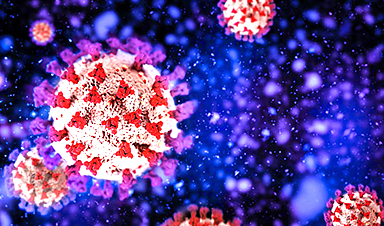For the past several months, Omicron subvariants BA.4 and BA.5 have dominated COVID-19 cases in the U.S. But now, there's a class of new COVID subvariants on the rise and one in particular is getting plenty of attention. It's called XBB—or Gryphon—and there's a chance it could overtake everything else out there.
XBB is getting a lot of buzz because it spreads fast—and seems to be able to evade immunity that people have built up from having a previous COVID-19 infection or getting the vaccine, says William Schaffner, M.D., an infectious disease specialist and professor at the Vanderbilt University School of Medicine. Still, Dr. Schaffner says, "it's early days and we have a lot to learn."
Here's what we know about XBB so far, and why doctors are keeping a close eye on it.
What is the XBB COVID variant?
XBB is one of the "new class" of Omicron variants that are spreading fast right now, says Thomas Russo, M.D., professor and chief of infectious disease at the University at Buffalo in New York. That includes BQ.1.1, BQ.1, BQ.1.3, BA.2.3.20, and XBB, he says.
"XBB is a hybrid version of two strains of the BA.2 form of Omicron," explains Amesh A. Adalja, M.D., a senior scholar at the Johns Hopkins Center for Health Security. It's currently "spreading efficiently in Singapore," he adds.
The variant was first detected in August 2022 in India, and has been detected in more than 17 countries since then, including Australia, Bangladesh, Denmark, India, Japan and the U.S., per Singapore's Ministry of Health.
XBB is thought to have the best ability to evade antibody protections of these newly emerged COVID variants, according to a pre-print study from researchers in China. That study said that the new strains of Omicron, and XBB in particular, "are the most antibody-evasive strain tested, far exceeding BA.5 and approaching SARS-CoV-1 level." (SARS-CoV-1, in case you're not familiar with it, is the strain of coronavirus that causes SARS, a respiratory virus that can cause severe illness.)
Meaning, the vaccine and having previously had COVID-19 are not thought to offer the same level of protection against XBB as they have with previous strains of COVID-19. Antibody drugs like Evusheld and bebtelovimab may also not be very effective against XBB, the pre-print study says.
"These variants are evolving to evade protection," Dr. Russo says. The bivalent booster is "likely going to be protective against severe disease" with XBB, but will be "imperfect against preventing infection," Dr. Russo says.
Don't panic, though. "When it comes to evasion of vaccine protection, it's important to recognize that vaccine protection is not all or none," Dr. Adalja says. "Even with immune-evasive variants, vaccine protection against what matters most—severe disease—remains intact."
XBB variant symptoms
So far, symptoms of XBB seem to be similar to what they've been with COVID-19 in general. According to the Centers for Disease Control and Prevention (CDC), those can include:
· Fever or chills
· Cough
· Shortness of breath or difficulty breathing
· Fatigue
· Muscle or body aches
· Headache
· New loss of taste or smell
· Sore throat
· Congestion or runny nose
· Nausea or vomiting
· Diarrhea
How contagious is the XBB subvariant?
Like other strains of Omicron, XBB is thought to be very contagious. Singapore's Ministry of Health notes that the variant now makes up 54% of COVID-19 cases in the country, up from 22% the week before.
Singapore's Ministry of health says that XBB is "at least as transmissible as currently circulating variants" but adds that "there is no evidence that XBB causes more severe illness."
When will the XBB subvariant peak?
There are a lot of unknowns about XBB right now. While it's been detected in the U.S., BA.5 and BA.4.6 continue to be the dominant variants in this country, per CDC data.
Other variants are also started to spread at the same time, Dr. Adalja says, and it's unclear which will displace BA.4.6 and BA.5 in the U.S., if they will at all. "It's likely to spread to some degree in the U.S. but unclear if it—or some other related variant such as BQ.1.1—will become dominant," he says.
Dr. Schaffner says there is "some concern" about XBB and fellow variants on the rise. "Watching what happens over the next several weeks is important," he says.
News
Urgent warning over deadly ‘brain swelling’ virus amid fears it could spread globally
Airports across Asia have been put on high alert after India confirmed two cases of the deadly Nipah virus in the state of West Bengal over the past month. Thailand, Nepal and Vietnam are among the [...]
This Vaccine Stops Bird Flu Before It Reaches the Lungs
A new nasal spray vaccine could stop bird flu at the door — blocking infection, reducing spread, and helping head off the next pandemic. Since first appearing in the United States in 2014, H5N1 [...]
These two viruses may become the next public health threats, scientists say
Two emerging pathogens with animal origins—influenza D virus and canine coronavirus—have so far been quietly flying under the radar, but researchers warn conditions are ripe for the viruses to spread more widely among humans. [...]
COVID-19 viral fragments shown to target and kill specific immune cells
COVID-19 viral fragments shown to target and kill specific immune cells in UCLA-led study Clues about extreme cases and omicron’s effects come from a cross-disciplinary international research team New research shows that after the [...]
Smaller Than a Grain of Salt: Engineers Create the World’s Tiniest Wireless Brain Implant
A salt-grain-sized neural implant can record and transmit brain activity wirelessly for extended periods. Researchers at Cornell University, working with collaborators, have created an extremely small neural implant that can sit on a grain of [...]
Scientists Develop a New Way To See Inside the Human Body Using 3D Color Imaging
A newly developed imaging method blends ultrasound and photoacoustics to capture both tissue structure and blood-vessel function in 3D. By blending two powerful imaging methods, researchers from Caltech and USC have developed a new way to [...]
Brain waves could help paralyzed patients move again
People with spinal cord injuries often lose the ability to move their arms or legs. In many cases, the nerves in the limbs remain healthy, and the brain continues to function normally. The loss of [...]
Scientists Discover a New “Cleanup Hub” Inside the Human Brain
A newly identified lymphatic drainage pathway along the middle meningeal artery reveals how the human brain clears waste. How does the brain clear away waste? This task is handled by the brain’s lymphatic drainage [...]
New Drug Slashes Dangerous Blood Fats by Nearly 40% in First Human Trial
Scientists have found a way to fine-tune a central fat-control pathway in the liver, reducing harmful blood triglycerides while preserving beneficial cholesterol functions. When we eat, the body turns surplus calories into molecules called [...]
A Simple Brain Scan May Help Restore Movement After Paralysis
A brain cap and smart algorithms may one day help paralyzed patients turn thought into movement—no surgery required. People with spinal cord injuries often experience partial or complete loss of movement in their arms [...]
Plant Discovery Could Transform How Medicines Are Made
Scientists have uncovered an unexpected way plants make powerful chemicals, revealing hidden biological connections that could transform how medicines are discovered and produced. Plants produce protective chemicals called alkaloids as part of their natural [...]
Scientists Develop IV Therapy That Repairs the Brain After Stroke
New nanomaterial passes the blood-brain barrier to reduce damaging inflammation after the most common form of stroke. When someone experiences a stroke, doctors must quickly restore blood flow to the brain to prevent death. [...]
Analyzing Darwin’s specimens without opening 200-year-old jars
Scientists have successfully analyzed Charles Darwin's original specimens from his HMS Beagle voyage (1831 to 1836) to the Galapagos Islands. Remarkably, the specimens have been analyzed without opening their 200-year-old preservation jars. Examining 46 [...]
Scientists discover natural ‘brake’ that could stop harmful inflammation
Researchers at University College London (UCL) have uncovered a key mechanism that helps the body switch off inflammation—a breakthrough that could lead to new treatments for chronic diseases affecting millions worldwide. Inflammation is the [...]
A Forgotten Molecule Could Revive Failing Antifungal Drugs and Save Millions of Lives
Scientists have uncovered a way to make existing antifungal drugs work again against deadly, drug-resistant fungi. Fungal infections claim millions of lives worldwide each year, and current medical treatments are failing to keep pace. [...]
Scientists Trap Thyme’s Healing Power in Tiny Capsules
A new micro-encapsulation breakthrough could turn thyme’s powerful health benefits into safer, smarter nanodoses. Thyme extract is often praised for its wide range of health benefits, giving it a reputation as a natural medicinal [...]





















